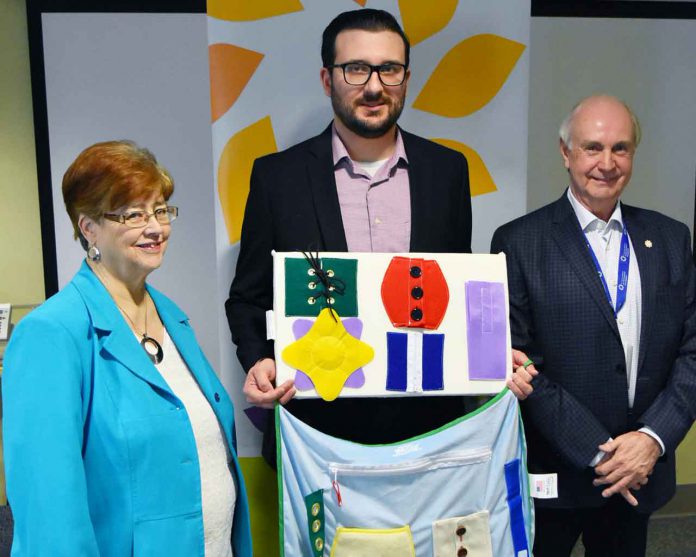
THUNDER BAY – HEALTH – For the 11th year in a row, the staff at the Thunder Bay Regional Health Sciences Centre applied for Family CARE grants for the ‘little things’ that can make a significant difference to patient care. Thanks to funding provided by donors to the Thunder Bay Regional Health Sciences Foundation along with the Volunteer Association to the Thunder Bay Regional Health Sciences Centre, this year close to $64,000 was provided to fund 31 Family CARE (Care Advancements Recommended by Employees) Grants.
Barry Streib, Secretary, and Chair, Governance for the Thunder Bay Regional Health Sciences Foundation and Shirley Wragg, Vice-President of the Volunteer Association, announced the grants this year. Each year they are inspired by what employees have suggested to better care for their patients and work with the grant committee to provide funding to as many areas of the Health Sciences Centre as possible.
“We saw some really practical applications this year, for items that are going to make a genuine difference for patients,” said Wragg. “Complex medical equipment like CT scanners and MRI machines are important, but these smaller items can also make a huge impact on a patient’s care. For instance, replacing a small probe on a fetal doppler with a larger one. The smaller one made it difficult, sometimes impossible, to detect fetal heartbeats causing anxiety and upset for the pregnant woman. The larger probe is faster and more effective at detecting the heartbeat and any potential problem in the fetus.”
Added Streib, “Another grant we funded was for fall mats with sensors to be used with patients who are vulnerable to falls because of balance or strength problems. Falls extend a patient’s stay in the hospital and impact their mobility. If for any reason, they step on the mat to get out of their chair, wheelchair or bed unassisted, the sensor alerts the nursing staff who can respond immediately to prevent a fall. I think this is a great example of what these grants are all about.”
In total 31 Family CARE grants, ranging from $90 to $5,000 were announced which will fund the purchase of equipment that will benefit patients across the Health Sciences Centre. Some of the other items making a difference in 2020, thanks to the 2019 grants, include:
- Boogie board LCD writing tablets for Rehab Services to help occupational and physical therapy patients communicate and strengthen fine motor skills.
- A tipi to provide a cultural space at the hospital to perform Indigenous ceremonies, gatherings, teachings, and storytelling
- An interactive flat panel device for Child and Adolescent Mental Health to provide visual and interactive learning for patients who attend education classes each weekday morning
- Additional musical instruments (guitar and percussion instruments) for patients in Adult Mental Health to play and enjoy the therapeutic benefits of music
- Additional Vac-pacs to help position a patient for surgery. When soft, it is molded around the patient then when the air is removed it becomes firm, keeping the patient securely in position.
A few of the funded grants funded stood out to the grant committee. One was equipment for the Adult Mental Health Department’s kitchen. Manager Joelle Macey explained. “Our Therapeutic Recreation staff Donna Ross guides a program that teaches patients about nutrition, how to cook, bake and preserve food. Patients learn valuable life skills like shopping for food, comparing costs and planning and organizing for meals. They also benefit from the distraction of focusing on chopping, stirring and other tasks which also brings people back into the moment. This is also a healthy practice called mindfulness.”
Another was the request for activity blankets and pillows for the hospital’s Hospital Elder Life Program (HELP) program. Manager of 2A/HELP, Matthew Shonosky, explained. “These blankets and pillows are for Alzheimer’s and dementia patients. As these diseases progress, behaviors develop in these patients like fidgeting and grabbing things to occupy themselves including, sometimes, their IVs or medical tubing which is stressful for nursing staff. The benefit of the blankets and pillows, which have pockets, buttons, laces, and Velcro, is they keep these patients stimulated for hours which helps them stay calm and relaxed.”
A full list of all 2019 grants can be found online at healthsciencesfoundation.ca/familycare






